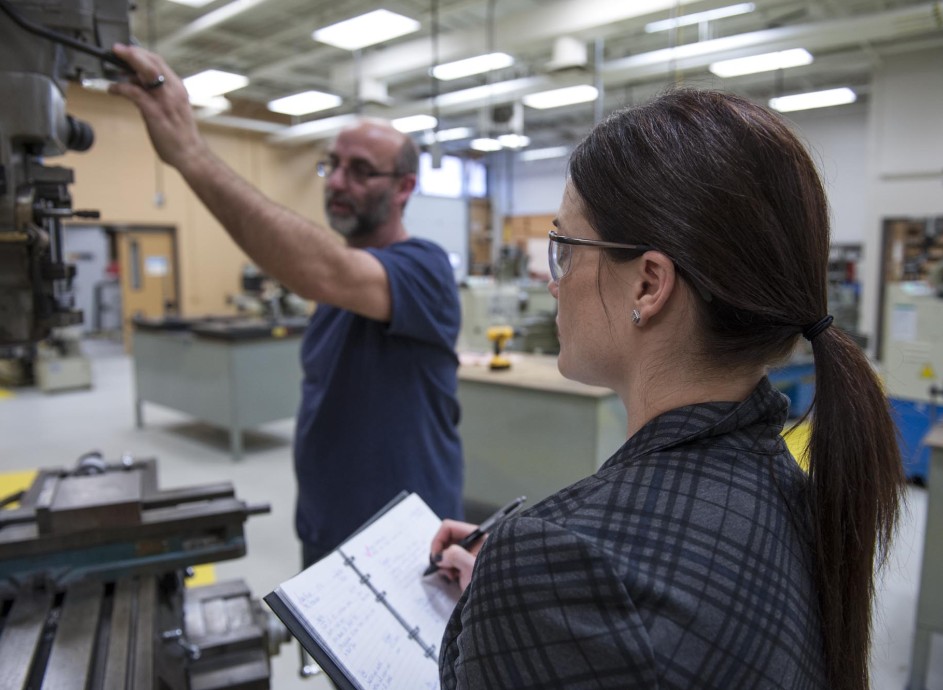Advanced Ergonomics Studies

*Domestic applicants include Canadian citizens, permanent residents, protected persons and Convention refugees.
The first of its kind in Canada, Fanshawe’s ergonomic training will provide you with opportunities to expand your fundamental understanding of the science of human-machine interactions and injury prevention through optimizing the design and workspaces of workplaces from manufacturing to healthcare.

Fanshawe’s advanced ergonomics training focuses on the concepts of human-centered design and the optimization of the workplace to prevent injuries. The program is led by seasoned professional ergonomists and classroom learning is reinforced with hands-on labs that utilize the diversity of workplaces at the Fanshawe campus and field placements that will put your analytical tools to the test. You’ll provide injury prevention and universal design recommendations using a variety of technologies and techniques including exoskeletons, wearables and virtual reality to evaluate and optimize worker and workspace interactions. There are many career opportunities in this growing field.
Upon completion of the program, graduates may apply to the Canadian College for the Certification of Professional Ergonomists (CCCPE) for the designation of Associate Ergonomist. CCCPE is an international certification and has been recognized by the International Ergonomics Association. Find further information regarding certification by the CCCPE. Students will also have the opportunity to attend the Applied Ergonomics Conference.
Hours of study required for designation
Students who intend to pursue the Associate Ergonomist designation from the Canadian College for the Certification of Professional Ergonomists are encouraged to complete the following hours of study in the disciplines listed below at a post-secondary institution:
• Anatomy (45 hours)
• Physiology (45 hours)
• Biomechanics (45 hours)
• Qualitative and Quantitative Design and Analysis (45 hours)
Program timetable: The timetable includes afternoon and evening classes.
Career Information
Fanshawe’s Advanced Ergonomics Studies graduate program provides graduates with theoretical and practical knowledge to optimize how products, environments and systems can effectively influence how people interact and engage each other. Career opportunities are diverse and may involve physical ergonomics and/or cognitive ergonomics in a variety of sectors, including health care, industry and manufacturing, government, utilities, software companies and consultancies. Job titles vary by the sector and area of specialization, but include ergonomist, occupational health and safety specialist, human factors engineer and product designer.
Did you know Fanshawe consistently ranks high in graduation employment rates among large colleges in Ontario? The advanced ergonomics graduates have over an 86% employment rate.
Here are some examples of career opportunities for graduates of Fanshawe’s Advanced Ergonomic Studies program:
Ergonomist, Automotive sector
The design of parts, processes and products. Work with engineers, management and workers to assess, design and optimize the workplace to prevent injuries.
Environmental, Health and Safety Coordinator
Ergonomics is a key component of environmental health and safety compliance. Our Advanced Ergonomics Studies graduates bring unique skills to health and safety teams.
Field Placement Information
Faculty Members
Program Advisory Committee
The graduate has reliably demonstrated the ability to:
Karen Hoodless
A Degree in Kinesiology or Human Kinetics
OR
A Degree in Engineering, Health Sciences, Nursing (or equivalent)
or in a related discipline (as determined by the College)
AND
Successful completion of the following university or college
courses (as determined by the College):
- Anatomy
- Physiology
- Biomechanics
- Qualitative and Quantitative Design and
Analysis
Note:
- Applicants who lack the required Anatomy and Physiology may still
gain eligibility for admission by completing appropriate
prior upgrading. Please contact the Program Coordinator for
more information about online courses.
| Test | Score |
|---|---|
| TOEFL iBT | 88 |
| IELTS Academic | Overall score of 6.5 with no score less than 6.0 in any of the four bands |
| CAEL | Overall score of 70 with no score less than 60 in any of the four bands |
| PTE Academic | 59 |
| Cambridge English | Overall score of 176 with no language skill less than 169 |
| ESL4/GAP5 | Minimum grade of 80% in Level 9, 75% in Level 10 |
| Duolingo | Overall score of 120, with no score lower than 105 |
| LANGUAGECERT | Overall score of 70 with no score less than 65 in any of the four skills |
| Level 1 | ||||
| Take all of the following Mandatory Courses: | ||||
| ERGO-6006 | Ergonomics Theory & Practice | 4.5 | ||
| This course, along with the hands-on experience gained in the lab, will build upon students' fundamental understanding of ergonomic principles and the application of those principles in the design of work systems including the assessment of workplaces and injuries through use of ergonomic tools and implementation of solutions. Topics of study will also include: ergonomic methodology and measurement, ergonomic assessment tools, program implementation including cost benefit analysis and psychosocial factors that impact worker performance. The course includes practical application of the assessment tools and theory through laboratory assignments. The final project will allow the students to demonstrate their understanding of the course content through application to a real world problem in the workplace. | ||||
| ERGO-6011 | Research Methods & Statistics | 5 | ||
| This course will prepare students to conduct research and academic writing as it applies to the field of ergonomics. The research process will be introduced including: literature review, conceptualization, operationalization, and report writing.The foundations of statistical analysis will also be examined including: ANOVA, t-tests, and post-hoc tests. Additional focus will be given to the importance of sample sizes, power, and the corresponding effects on research outcomes. At the end of the course, students will be able to design a study, interpret research findings, and critically examine technical reports. The students will also learn how to use statistical software to help them solve their research problems, and present their data in an effective and efficient manner. | ||||
| ERGO-6004 | Human-Computer Interactions | 2 | ||
| This course introduces students to the methodologies and principles for designing user interfaces, as well as the importance of program layout and suitability. Additional focus will be given to human psychology and how humans process information and react to their environment. | ||||
| ERGO-6012 | Safety in the Workplace | 3 | ||
| This course, along with the hands-on experience gained in the lab, will build upon students' fundamental understanding of ergonomic principles and the application of those principles in the design of work systems including the assessment of workplaces and injuries through use of ergonomic tools and implementation of solutions. Topics of study will also include: ergonomic methodology and measurement, ergonomic assessment tools, program implementation including cost benefit analysis and psychosocial factors that impact worker performance. The course includes practical application of the assessment tools and theory through laboratory assignments. The final project will allow the students to demonstrate their understanding of the course content through application to a real world problem in the workplace. | ||||
[1] Total program costs are approximate and subject to change. They do not include additional fees such as the health and dental plan, bus pass, or general expenses. Learn more about ancillary and additional fees.